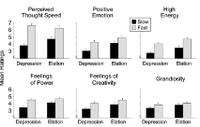A Sense of Proportion

“Without a sense of proportion there can be neither good taste nor genuine intelligence, nor perhaps moral integrity.”
–Eric Hoffer (American Longshoreman, Writer and Philosopher, 1902-1983)

“The Passionate State of Mind: And Other Aphorisms” (Eric Hoffer)
The Grass Is Always Greener On the Other Side

“It’s when you are safe at home that you’re having an adventure. When you’re having an adventure you wish you were safe at home.”
–Thornton Niven Wilder (American Novelist and Playwright, 1897-1975)
Seeing the Whole Picture

“Perception of inconsistencies, of oppositions and of flat contradictions…these seem to be products of partial cognition, and fade away with cognition of the whole.”

–Abraham H. Maslow (American Psychologist, 1908-1970)
The True Value of Things

“The height of ability consists in a thorough knowledge of the real value of things, and of the genius of the age in which we live.”
–François, Duc de La Rochefoucauld (French Writer and Moralist, 1613-1680)
The Long View

“And it is not our part here to take thought only for a season, or for a few lives of Men, or for a passing age of the world. We should seek a final end of this menace, even if we do not hope to make one.”
–Gandalf in “The Fellowship of the Ring”
Our Living Globe

“It is easy to forget that man has taken a look at his home from the outside only in the last twenty years and the profound and almost mystical effect upon the astronauts has been embraced by the species as a whole. We can see our planet as an exquisite, luminous, living globe hanging undivided in the silence of space. The testimonies from space bring home with a fresh impact just what a rare and precious opportunity of life we share within the planet as one whole ecosystem and us as a part of it.”
–Yatri (a.k.a. Malcolm Godwin, English Artist, Spiritual Seeker and Writer, 1936-)

“Unknown Man: The Mysterious Birth of a New Species” (Yatri)
Perspectives and Aspirations

“The confined space I occupy is so minute when compared with the rest of the universe, where I am not and have no business to be; and the fraction of time I shall live is so infinitesimal when contrasted with eternity, in which I have never been and never shall be . . . And yet here, in this atom of myself, in this mathematical point, blood circulates, the brain is active, aspiring to something too . . .”
–Ivan Sergeyevich Turgenev (Russian Writer, 1818-1883)

“Fathers and Sons (Oxford World’s Classics)” (Ivan Turgenev)
A Perspective on Worry

“Do you remember the things you were worrying about a year ago? How did they work out? Didn’t you waste a lot of fruitless energy on account of most of them? Didn’t most of them turn out all right after all?”
–Dale Carnegie (American Educator and Author, 1888-1955)
Thinking Speed, Mood and Optimism

There’s a very interesting article at the Mixing Memory blog. It’s one of the blogs that I highlight in the “What I’m reading” section. The articles highlights some recent research by Emily Pronin and Dan Wegner from Princeton and Harvard respectively, entitled “Manic Thinking: Independent Effects of Thought Speed and Thought Content on Mood.”
It’s about an intriguing issue. People who have a manic illness have an acceleration of thinking processes together with elevated mood and energy level. Mania is also associated with racing thoughts grandiose or creative ideas, fast, uninterruptible speech, aimless pacing, irritability and an over-involvement in pleasurable activities, together with a loss of impulse control.
It may sound great, and initially people are often very happy to be manic. But after a while it can give way to exhaustion or the realization that some of their choices have been unwise. I once knew someone who was driving a brand new BMW – that she could definitely not afford – at over 120 miles an hour, the wrong way down Interstate 95. That’s when the police became involved, and they immediately realized that she was not a villain, but a very sick person who could have killed herself and a ton of other people.
The researchers they had a group of college undergraduates read a series of 58 emotion-inducing statements out loud, and to do it at either a fast or slow pace. The statements are emotionally neutral at the beginning and then become progressively more emotionally positive or negative. The idea is that reading a series of progressively more positive or negative statements will affect the reader’s mood. The letters in the statements were presented one at a time, either for 40 milliseconds per letter (“fast thinking” condition) or 170 milliseconds per letter (“slow thinking”). A pilot study indicated that the 40 milliseconds per letter reading time were about twice the normal reading speed for college undergraduates and 170 milliseconds were about half the normal speed. The time between statements also varied, with only 320 milliseconds between statements in the “fast condition” and 4 seconds between statements in the “slow condition.”
After reading all 58 statements, the participants were asked to answer a series of questions designed to assess their mood, energy level, feelings of power, creativity and inspiration. There were also questions to evaluate “grandiosity or inflated self-esteem,” together with their own perceptions of their speed of thought.
Subjects in the “fast thought” condition reported faster thought speeds than those in the “slower” condition. As predicted, faster thought speeds affected mood and mania-related feelings, participants in the fast thought condition reported being happier, had higher energy levels, experienced greater senses of power and creativity, and higher levels of grandiosity (though self-esteem did not differ between conditions). What is important, is that these effects were independent of the mood manipulation (positive or negative statements). Here is a graph from the paper presenting the effects of slow and fast thinking as a function of the type of sentence:

This study has some important implications. Thinking more quickly produces elevations of mood and self-perception that can smetimes be similar to those of very mild mania. I have seen this happen frequently when people have been up all night: the bright lights of morning and a few cups of coffee make them appear mildly manic. For a time they do in fact impress with their creativity and mastery not only of details, but of the “Big picture.” But as time goes on, much of their thinking turns out to be not altogether logical.
The study also raises the possibility that some manic symptoms may be produced by thinking. There is an old term from the psychoanalytic literature called “manic defense,” in which people use manic-like symptoms to protect themselves – or more accurately their ego structures – when under stress.
I have spent most of my life with people who think very quickly and accurately. Most also express themselves very well: both succinctly and fluently. But all have also known the importance of stopping for a while after a brainstorming session, so that we can see if our ideas have really born fruit, or if they just seemed a good idea at the time.
There is no question that moving and speaking more quickly can elevate our mood. It is no surprise that it has little impact on self-esteem. It is becoming more and more clear that self-esteem follows from genuine achievement. Boosting artificially is difficult, with one exception: when people have every reason to have decent self-esteem, but instead they keep feeling bad, as if they have a kind of leaky bucket as my friend the psychiatrist Stephen Preas calls it.
I remember an experiment in which an investigator was experimenting with ether. During one of his sessions he had a deeply felt mystical experience in which he was sure that he suddenly understood the whole of nature and reality. He immediately wrote it down so that he could show the world The Secret.
When he came back down to earth, he looked at what he had written, “The world is like a fish…”
“The world that we have created is a product of our thinking. It cannot be changed without changing our thinking.”
–Albert Einstein (German-born American Physicist and, in 1921, Winner of the Nobel Prize in Physics, 1879-1955
)
“Some would sooner die than think. In fact, they often do.”
–Bertrand Russell (Welsh Mathematician, Philosopher, Pacifist and, in 1950, Winner of the Nobel Prize in Literature, 1872-1970)
“Most people can’t think, most of the remainder won’t think, the small fraction who do think mostly can’t do it very well. The extremely tiny fraction who think regularly, accurately, creatively, and without self-delusion. In the long run, these are the only people who count.”
–Robert Heinlein (American Writer, 1907-1988)
The Best Things In Life Aren't Things
I was sorry to hear this morning that Art Buchwald has just passed away at the age of 81, having defied the odds for a year after entering a hospice.
I’ve enjoyed his columns for years, and the title of this post is one of my most favorite Buchwald-isms. And it sums up a lot of his work. Hidden beneath the satire and humor there was always a wise, pithy and unsightful comment.
Just think about that for a moment, "The best things in life aren’t things." He’s right isn’t he, and how often do we all forget it?
Here are a few from my collection that I hope you will like.
Farewell Art.
_______________________
“A bad liver is to a Frenchman what a nervous breakdown is to an American. Everyone has had one and everyone wants to talk about it.”
“And Man created the plastic bag and the tin and aluminum can and the cellophane wrapper and the paper plate, and this was good because Man could then take his automobile and buy all his food in one place and He could save that which was good to eat in the refrigerator and throw away that which had no further use. And soon the earth was covered with plastic bags and aluminum cans and paper plates and disposable bottles and there was nowhere to sit down or walk, and Man shook his head and cried: "Look at this Godawful mess."
“I don’t know what’s coming next and neither does anyone else. It’s something that we do have to face but the thing is that a lot of people don’t want to face it. And there’s denial. If somebody says it, like me, everybody feels a little better that they can discuss it.”
“I don’t know whether it’s normal or not, but sex has always been something I take seriously. I would put it higher than tennis on my list of constructive things to do.”
“I worship the quicksand he walks in.”
“People are broad-minded. They’ll accept the fact that a person can be an alcoholic, a dope fiend, a wife beater and even a newspaperman, but if a man doesn’t drive, there’s something wrong with him.”
“The buffalo isn’t as dangerous as everyone makes him out to be. Statistics prove that in the United States more Americans are killed in automobile accidents than are killed by buffalo.”
“We seem to be going through a period of nostalgia, and everyone seems to think yesterday was better than today. I don’t think it was, and I would advise you not to wait ten years before admitting today was great. If you’re hung up on nostalgia, pretend today is yesterday and just go out and have one hell of a time.”
“Whether it’s the best of times or the worst of times, it’s the only time we’ve got.”






